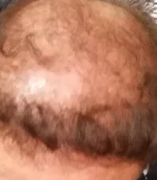The first step in evaluating hair loss in women, after a detailed history and physical exam, is to rule out any underlying medical causes of hair loss that can be treated. If clinically appropriate, the following disease processes should be considered: anemia, thyroid disease, connective tissue disease, gynecological conditions and emotional stress. Furthermore, over 50% of women going through a change of life or hormone fluctuations (menopause) experience significant hair loss. It is also important to review the use of medications that may cause hair loss, such as (but not limited to) oral contraceptives, beta-blockers, Vitamin A, thyroid drugs, coumadin, and prednisone.
The following laboratory tests have been recommended to rule out the aforementioned medical conditions:
- Sex Hormone tests
- SHBG (Sex Hormone Binding Globulin) used to test status of male hormones
- Estradiol is a sex hormone
- FSH (Follicle Stimulating Hormone) *not hair follicle but follicle in the ovary*
- LH (Luteinizing Hormone) is a sex hormone
- Free Testosterone
- Total Testosterone
- ANA (Anti Nuclear Antibody) used to test for Lupus or other autoimmune diseases
- TSH (Thyroid Stimulating Hormone) used to test for hyper or hypo-thyroid disease
- Test Iron status
- TIBC (Total Iron Binding Capacity)
- Ferritin
- Iron


